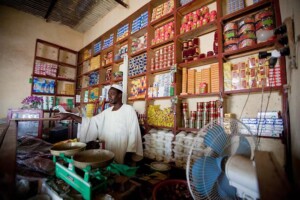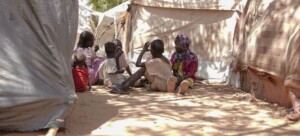Pharmacists angry as Sudan plans to liberalise medicine prices amidst dengue outbreak
Sudan is witnessing its worst outbreak of dengue fever in over a decade, especially North and South Kordofan and Red Sea state are hit hard. The Ministry of Health is planning to liberalise pharmaceutical prices but pharmacists warned against this move.
 A laboratory in El Sereif Hospital, North Darfur (File Photo: Albert González Farran / UNAMID)
A laboratory in El Sereif Hospital, North Darfur (File Photo: Albert González Farran / UNAMID)
Sudan is witnessing its worst outbreak of dengue fever in over a decade, especially North and South Kordofan and Red Sea state are hit hard. The Ministry of Health is planning to liberalise pharmaceutical prices but pharmacists warned against this move.
Cases of dengue fever and malaria are on the rise in Sudan after recent floods, which have allowed diseases transmitted by mosquitoes to spread faster as post-flood conditions are ideal for these animals who lay their eggs on the surface of stagnant waters.
“Floods caused by warming temperatures and a lack of preventive care are driving the spread of the disease,” the Guardian explained yesterday. These conditions are worsening as climate change is causing the weather to become more extreme in Sudan.
Director General of Emergencies at the federal Ministry of Health Dr Muntasir Osman told the news outlet that 2022 had seen “the largest spread of the fever geographically in the history of the country” with 1,430 cases registered.
South Kordofan now recorded three confirmed cases of dengue fever out of 75 suspected cases.
Director of the Ministry of Health and Social Development in South Kordofan Reda Abdelhadi explained that the ministry has “an integrated plan” to address the epidemic through campaigns to combat the Aedes Aegypti mosquitoes that spread the disease and organise awareness campaigns.
The director told reporters in the state capital Kadugli this morning that strict surveillance is continuing and so is the investigation of patients to confirm and report cases.
Radio Dabanga reported last week that such confirmation is difficult as there is only one laboratory in the whole of Sudan that can confirm vector-borne diseases.
Vector-borne diseases are illnesses caused by parasites, viruses, and bacteria that are transmitted by 'vectors', such as mosquitos or ticks. These diseases include malaria, dengue fever, yellow fever, zika, chikunguya, and Rift Valley fever.
Support campaigns
Youth groups in Kadugli have initiated a voluntary blood donation campaign for dengue patients in neighbouring North Kordofan. They are calling on the population of the South Kordofan capital to donate blood.
The campaign is implemented in cooperation with the South Kordofan Laboratories and Blood Banks Department of the Ministry of Health and Social Development. Its director, Fakhreldin Shaddad, told Radio Dabanga that the campaign was initiated by the youth from ‘Emergency Street’, ‘For Our Country’, the Taferi Neighbourhood, and the Youth Peer Education Network groups.
He said that these recurrent campaigns are organised at the beginning of each year, but this time they started the campaign earlier because of “exceptional circumstances in North Kordofan”.
In North Kordofan, doctors recently called to declare the capital El Obeid a disaster area due to the outbreak of dengue fever.
Increased financing
Sudan’s Minister of Health has demanded an increase in health financing and a review of health financing systems in the country.
During his address to a workshop on the reform of the health financing system in Sudan, held in Khartoum on Sunday, acting Minister of Health Haisam Ibrahim said that an increase in health financing from nine to 15 per cent of the national budget is necessary.
A thorough review of health financing systems is also much needed.
The most important recommendation by the workshop concentrated on the prices of medicines. Medicine pricing should be amended again according to the new, floating dollar rate to help increase the availability of medical supplies and payment of debts to suppliers, they stated.
For the country’s Health Ministry to keep control over all health services, an oversight and approval board is to be established under the supervision of the federal minister.
Clear policies should be developed to increase spending on prevention to reduce the cost of treatment, in addition to the provision of free treatment centres distributed fairly over the country, better transportation of medical supplies, and improved facilitation of health insurance.
Warnings against liberalisation
Following the minister’s statement, the Professional Pharmacists Association warned of the dire consequences of the decision “to liberalise the dollar price regarding medicines in order to increase medical supplies in the country”.
The pharmacists said in a press statement yesterday that the decision will certainly lead to doubling the prices of medicines in pharmacies, which will reduce access to medical supplies for many Sudanese.
Pharmacist Farid Abdelwahab told Radio Dabanga that the liberalisation of the exchange rates for medicine prices will exacerbate the suffering of patients, even of those who have health insurance.
The statement explained that medicines were priced using a fixed exchange rate of one US dollar to SDG18 until the end of 2019. In early 2020, the rate was raised to SDG55 and in 2021 to SDG165. Since then, the exchange rate increases continued to approach the price of the “fully liberalised dollar”.
According to the Central Bank of Sudan (CBoS), the US dollar selling rates currently fluctuate between SDG567 and SDG583 for 1USD.











 and then
and then